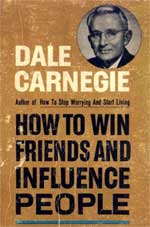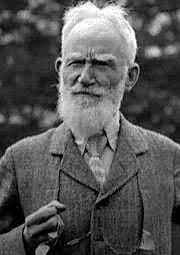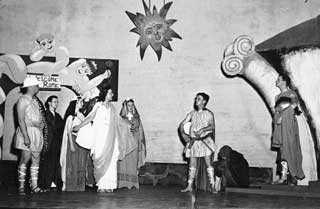How to Win Friends and Influence People
February 15th, 2007 at 10:09 am (Reviews, Success)
There’s a famous story of a young woman who dined one evening with William Gladstone, and the next evening with Benjamin Disraeli. (Gladstone and Disraeli were prominent British statesmen of the nineteenth century. They were bitter rivals.)
Asked her impression of these two powerful men, the young woman said, “When I left the dining room after sitting next to Mr. Gladstone, I thought he was the cleverest man in England. But after sitting next to Mr. Disraeli, I thought I was the cleverest woman in England.”
This anecdote illustrates the message at the heart of Dale Carnegie’s classic How to Win Friends and Influence People. To win others to your way of thinking, put yourself in their shoes.  See life from their perspective.
See life from their perspective.
This is easier said than done. We are each wrapped up in our own lives. We have our own goals and our own worries. It’s difficult to surrender ego for the sake of another person. Yet that’s the key to dealing with people: Do unto others as you would have them do unto you. The Golden Rule, says Carnegie, is prevalent in nearly every culture, and is the basis for dealing with others.
How to Win Friends covers four broad topics:
- Fundamental techniques in handling people
- How to make people like you
- How to win people to your way of thinking
- How to change people without giving offense or arousing resentment
Each of the book’s chapters has a title that sounds like a link-baiting weblog entry. Each chapter offers a catchy maxim. This makes the entire text easy to boil down to outline form, which I’ve done below. (Doing this tosses aside the essential flavor of the book, though. I encourage you to read it.)
Fundamental Techniques in Handling People
This introductory section gives a broad overview of Carnegie’s topic, and establishes the three core tenets of his philosophy.
- If you want to gather honey, don’t kick over the beehive. Don’t criticize, condemn, or complain.
- The big secret of dealing with people: Give people a feeling of importance — be hearty in your approbation and lavish with your praise.
- He who can do this has the whole world with him; he who cannot walks a lonely way: First arouse in the other person an eager want.
Six Ways to Make People Like You
In this section, Carnegie covers the basic skills for getting along well with others. These techniques are useful under any circumstance.
- Do this and you’ll be welcome anywhere: Become genuinely interested in other people.
- A simple way to make a good first impression: Smile.
- If you don’t do this, you are headed for trouble: Remember that a man’s name is to him the sweetest and most important sound in any language. [Note: Unfortunately, some people read this and go overboard. It's tedious to deal with a salesperson who insists on repeating your name over and over.]
- An easy way to become a good conversationalist: Be a good listener. Encourage others to talk about themselves.
- How to interest people: Talk in terms of the other man’s interests.
- How to make people like you instantly: Make the other person feel important — and do it sincerely.
Twelve Ways to Win People to Your Way of Thinking
What’s the best way to settle a disagreement in your favor? My mantra is: If you want to defeat your enemy, sing his song. Carnegie’s approach is similar:
- You can’t win an argument: The only way to get the best of an argument is to avoid it.
- A sure way of making enemies — and how to avoid it: Show respect for the other man’s opinions. Never tell a man he is wrong.
- If you’re wrong, admit it: If you are wrong, admit it quickly and emphatically.
- The high road to a man’s reason: Begin in a friendly way.
- The secret of Socrates: Get the other person saying “yes, yes” immediately.
- The safety valve in handling complaints: Let the other man do a great deal of the talking.
- How to get co-operation: Let the other fellow feel the idea is his.
- A formula that will work wonders for you: Try honestly to see things from the other person’s point of view.
- What everybody wants: Be sympathetic with the other person’s ideas and desires.
- An appeal that everybody likes: Appeal to the nobler motives.
- The movies do it. Radio does it. Why don’t you do it? Dramatize your ideas.
- When nothing else works, try this: Throw down a challenge.
Nine Ways to Change People Without Giving Offense or Arousing Resentment
The book’s final section suggests techniques for changing other people.
- If you must find fault, this is the way to begin: Begin with praise and honest appreciation.
- How to criticize — and not be hated for it: Call attention to people’s mistakes indirectly.
- Talk about your own mistakes first: Talk about your own mistakes before criticizing the other person.
- No one likes to take orders: Ask questions instead of giving direct orders.
- Let the other man save his face.
- How to spur men to success: Praise the slightest improvement and praise every improvement.
- Give the dog a good name: Give a man a fine reputation to live up to.
- Make the fault seem easy to correct: Use encouragement. Make the thing you want the other person to do seem easy.
- Making people glad to do what you want: Make the other person happy about doing the thing you suggest.
Early editions of the book include an additional section describing “Seven rules for making your home life happier”. I suspect this content was removed for fear of stirring up a hornet’s nest. It does little more than rehash the previous sections, anyhow.
Each time I read the How to Win Friends, I get the impression that Carnegie ran out of steam toward the end. The first half is packed with letters and stories that elaborate his points. Later chapters are brief. Some are only a page long. This puzzles me, and weakens the book somewhat, but not enough to ruin it.
I enjoy How to Win Friends and Influence People. I read it at least once a year. It’s an easy book to mock — its earnest tips can seem idealistic and childish to the cynical — but its advice is straightforward and practical.  Best of all, this book is readable. Carnegie has an easy, personable style, and he fills each chapter with engaging anecdotes from students and readers who have put his precepts to action. (Later editions are charming because they intermix the best stories from the original 1936 edition with anecdotes from the 70s and 80s — it’s fun to read a story about a computer programmer followed by a story of a man who’s trying to sell “motor cars”.)
Best of all, this book is readable. Carnegie has an easy, personable style, and he fills each chapter with engaging anecdotes from students and readers who have put his precepts to action. (Later editions are charming because they intermix the best stories from the original 1936 edition with anecdotes from the 70s and 80s — it’s fun to read a story about a computer programmer followed by a story of a man who’s trying to sell “motor cars”.)
This book is easily misinterpreted. I’ve heard it condemned for encouraging people to be obsequious flatterers. Yet Carnegie loathes insincerity. He doesn’t want his readers to turn into toadies; he wants his readers to genuinely learn to think in terms of other people’s interests. His goal is a “win-win” situation.
How to Win Friends, first published in 1936, is just as relevant in 2007 as it was seventy years ago. Because it was one of the most popular books of the twentieth century, copies are easy to find cheap at book stores, thrift shops, and garage sales.
From the Wikipedia: “Dale Carnegie (November 24, 1888 - November 1, 1955) was an American writer and the developer of famous courses in self-improvement, salesmanship, corporate training, public speaking and interpersonal skills. Born in poverty on a farm in Missouri, he was the author of How to Win Friends and Influence People, first published in 1936, a massive bestseller that remains popular today. He also wrote a biography of Abraham Lincoln, titled Lincoln the Unknown, as well as several other books.”
 That fall, before the upperclassmen had returned to campus, we were introduced to the rigors of college life by dissecting Shaw.
That fall, before the upperclassmen had returned to campus, we were introduced to the rigors of college life by dissecting Shaw.
 I’ve seen too much and read too much, so that I have come to believe that everything is cloaked in shades of grey. Every viewpoint has some credence. There is little in this world that is absolute. There are some aspects of communism that seem fair and just. There are some aspects of capitalism that are fair and just. Which is better? Who is to say? How do you measure better? The Left can tell you that you measure it in one way, while the Right will tell you that you measure it in another way. I will say that I am pleased to live in the United States, where I am allowed a great deal of freedom and am able to provide for myself if that’s what I desire. However, I also recognize that as a white male, I am afforded opportunity that is not available to all members of this society.
I’ve seen too much and read too much, so that I have come to believe that everything is cloaked in shades of grey. Every viewpoint has some credence. There is little in this world that is absolute. There are some aspects of communism that seem fair and just. There are some aspects of capitalism that are fair and just. Which is better? Who is to say? How do you measure better? The Left can tell you that you measure it in one way, while the Right will tell you that you measure it in another way. I will say that I am pleased to live in the United States, where I am allowed a great deal of freedom and am able to provide for myself if that’s what I desire. However, I also recognize that as a white male, I am afforded opportunity that is not available to all members of this society.